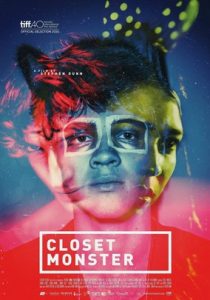Clown in a Cornfield-2025
Director Eli Craig
Starring Katie Douglas, Aaron Abrams
Scott’s Review #1,488
Reviewed August 7, 2025
Grade: B+
Clown in a Cornfield (2025) is a surprisingly satisfying throwback to 1980s slasher horror films but with a modern twist.
The fun vibe creates an entertaining experience that doesn’t take itself too seriously, incorporating comic moments and blending twenty-first-century technology with traditional genre standards.
Additionally, a juicy and surprising same sex romance is revealed in the final stages of the film, when typically the crazed killer whodunit would be the featured main attraction.
The film feels vintage, containing killer clowns, a midwestern cornfield, and eerie townspeople. These one-time clichéd add-ons suddenly feel fresh with a younger audience in mind.
Middle-aged horror buffs can fondly recall 1980s gems like Children of the Corn (1984), which is reminiscent primarily. There is something particularly unsettling about a rural plains area in the middle of nowhere and menacing figures emerging from a dusty cornfield late at night.
As with most creepy small-town horror films, there is a deadly secret harvesting amid the lonely, quiet nights.
In 1991, two fresh-faced teens sneak off into the nearby cornfield and are killed by the local mascot, Frendo the Clown.
Decades later, teenage Quinn Maybrook (Katie Douglas) and her father, Dr. Glenn Maybrook (Aaron Abrams), begrudgingly arrive in the quiet town of Kettle Springs, Missouri, after Quinn’s mother dies, hoping for a fresh start.
Quinn meets fellow students Cole (Carson MacCormac) and Rust (Vincent Muller), and they uncover a mystery surrounding the once-affluent small town that has fallen on hard times after the treasured Baypen Corn Syrup Factory burned down.
The adults warn Quinn to be wary of the high school cool kids, whom she quickly starts to hang out with. But is it the locals and Sheriff Dunne (Will Sasso) that Quinn and her father should be wary of? What is the symbolism of a haunting Baypen factory music box?
The screenwriters wisely, and fantastically, add a mix of humor to many sequences, which both counterbalance the bloodshed and provide laugh-out-loud, genuinely funny moments.
This mostly comes at the expense of two female supporting characters, Janet and an unnamed friend. After a series of pranks to initiate Quinn into their group, one girl assumes that a decapitated head belonging to her boyfriend is fake.
She giggles and juggles it between both her hands before she shrieks in horror at the realization that the head is real. Later, she trudges through the cornfield, complaining that she feels like she’s in a bad 1980s slasher movie.
The best kill comes when a buff, shirtless high school kid bench presses weights in his garage and is decapitated by Frendo. His head bounces into a laundry hamper, and the lid closes shut with exact precision.
I noticed a potent anti-nationalist message as the antagonists are portrayed as small-town, small-minded simpletons meant to represent the United States, the MAGA movement. They blame the teens for the town’s troubles and for ruining its public image.
In satisfying form, the teenagers make fools of the adults, except for Quinn’s father, who is one of the good guys and subsequently runs for mayor to rid the town of the dolts who currently control it.
The sexual preference of Quinn’s male crush is also a breath of fresh air in a genre that typically doesn’t stray too far from mainstream gender roles.
The 2020 novel of the same name, from which the film was adapted, might be superior, but Clown in a Cornfield (2025) is fun. It also proudly has one twist that I did not see coming, which has nothing to do with the deadly clowns.

